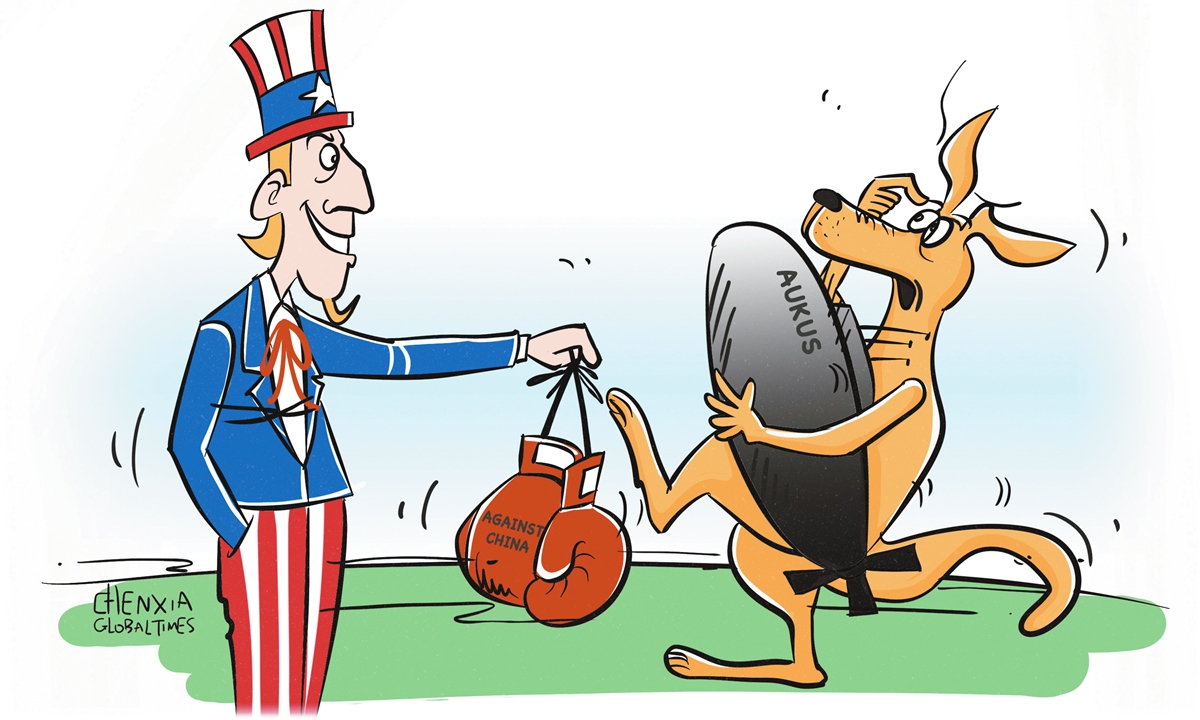Illustration: Chen Xia/GT
“I see Australia as the beachhead to counter China… That’s why AUKUS is so important,” said Michael McCaul, the chairman of the Republican House Foreign Affairs Committee, in a roundtable meeting on Wednesday.
The term “beachhead,” according to the dictionary, refers to an area on a hostile shore occupied to secure further landing of troops and supplies. This is how the US views Australia: as a frontline base in the Asia-Pacific to maintain US’ strategic and military presence in the region and to serve the “Indo-Pacific Strategy” aimed at countering China’s rise.
With the thawing of China-Australia relations, the US is growing anxious. Even the Australian media has noticed this: “McCaul’s remarks add to impressions that with Republicans controlling Washington, Australia may be asked to do more to challenge China in the Asia-Pacific, despite the stabilization of relations achieved by Prime Minister Anthony Albanese.”
“This once again highlights how Australia is being instrumentalized and weaponized by the US, at the sacrifice of Australia’s political, economic and security interests, disregarding its sovereignty to serve US national interests,” Chen Hong, director of the Australian Studies Center of East China Normal University, told the Global Times.
Recently, Australia has been promoting the stabilization, improvement and enhancement of its relationship with China. In June last year, Albanese published an opinion piece, saying, “Working productively with China will benefit everyone in the region.” Three months later, before the visit of Australian Treasurer Jim Chalmers to China, he made it clear that the discussions would focus on “stabilizing the economic relationship with China.”
The Asia-Pacific region has maintained relative peace and stability. Clearly, this is a situation the US doesn’t want to see, so it once again uses AUKUS to remind Australia: Your role is simply to serve as America’s “beachhead.”
But from its inception, AUKUS has been a burden and a liability for Australia. On September 15, 2021, the US, the UK and Australia announced the creation of AUKUS. Australia’s total investment in the plan is a staggering 368 billion AUD (about $242 billion), with an additional 555 million EUR (about $585 million) to be paid to France as compensation for the cancellation of a previous submarine deal.
What’s worse, due to US’ limited submarine production capacity and inadequate investment in UK and Australian shipyards, the AUKUS agreement is currently facing several challenges. More and more Australians believe that the US will ultimately fail to deliver the Virginia-class nuclear submarines. A possible alternative is that the US may station its nuclear submarines in Australian ports. Given that a US official has previously declined to explicitly guarantee that Australia will have full control of the AUKUS nuclear-powered submarines, Australia may ultimately face the loss of sovereignty over its submarine capabilities.
More importantly, Chen said the nuclear submarine fleet under the AUKUS framework is not tailored to Australia’s defense needs but serves the US’ military adventure plans against China. McCaul’s remarks about the US’ vision for the Asia-Pacific further support this point. “A third world war – if it occurred – would most likely break out in the Indo Pacific region… That’s why Australia, in my view, is the power in the Pacific that we need to fortify,” he said.
Albanese concluded his June article with the words, “Building a more prosperous and secure future for all who call the Indo-Pacific home.” This contrasts sharply with McCaul’s statement. For Australia, this is a strategic issue that requires deep thought and reflection: To what extent should Australia achieve its strategic autonomy and truly serve its own interests? Is the vision of the Asia-Pacific in the US blueprint the future Australia wants?




